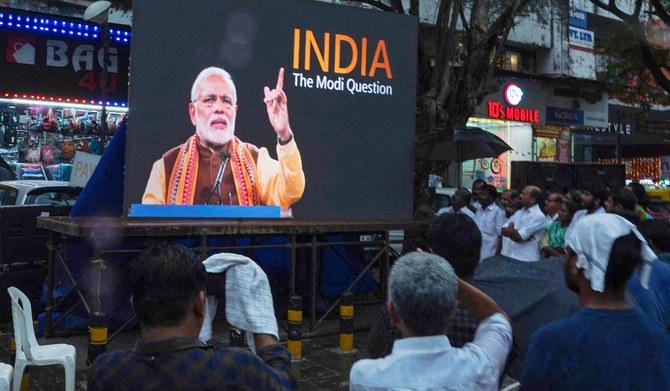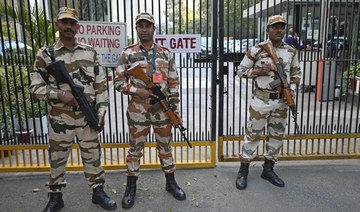NEW DELHI: At around 11 a.m. on Feb 14, some 20 Indian tax officials and police burst into the BBC's offices in New Delhi, shouting at staff to step away from their computers and hand over their mobile phones, according to two people present.
At the company's bureau in India's financial capital, Mumbai, tax officials launched a second raid. The government said the BBC had failed to respond to repeated requests to clarify its tax affairs related to the profits and remittances from its Indian operations.
The BBC has said it is cooperating fully with tax authorities and hopes to resolve matters quickly, adding its journalists would continue to report "without fear or favour". It declined to comment for this story.
Three weeks before the raids - which the government called a "survey" - the BBC released a two-part documentary that included an examination of Prime Minister Narendra Modi's role in sectarian riots in his home state of Gujarat in 2002 when he was chief minister there. The documentary, which was only broadcast in Britain, accused Modi of fostering a climate of impunity that fuelled the violence.
Modi's government has called the documentary "biased" and reflecting a "colonial mindset". Foreign Minister S. Jaishankar told the ANI news agency last week it was "politics by another means" and suggested its timing was intended to undermine support for Modi. The BBC has said it stands by the reporting.
The 72-year-old prime minister enjoys high approval ratings and is expected to run for reelection next year for the Hindu nationalist Bharatiya Janata Party (BJP).
In late January, Indian authorities ordered the removal of social media posts sharing the documentary and police detained some Indian students who tried to screen it, saying it would disturb the peace. They were released shortly afterwards.
The tax inspections at the BBC's offices - during which officials cloned the mobile phones of some senior staff and searched computers, according to the two people present - have highlighted the concerns of some journalists and media rights watchdogs about what they say is a decline in press freedom under Modi.
Reuters spoke to eight Indian journalists, industry executives and media analysts who said that some media which reported critically on the government have been targeted with inspections by government agencies, the suspension of state advertising, and the arrest of reporters.
"There's never been a golden age of Indian journalism," said Abhinandan Sekhri, chief executive of independent online media group, Newslaundry, whose offices in New Delhi were surveyed twice by tax officials in 2021 after critical coverage of Modi's administration. "But it has never been like it is now."
A criminal case filed by the tax department against Sekhri alleging tax evasion and forging a valuation report was thrown out by a judge in Delhi in November. Sekhri has sued the government for attacks on his fundamental rights and freedom of expression; the case is being heard in the Delhi High court.
Modi's government has vigorously denied the BBC tax inspection - the first against an international news organisation in decades - was a response to the film.
"The BBC operates under two private companies in India: like any other foreign company, they are open to scrutiny and tax laws apply to them," said Kanchan Gupta, senior adviser to the Ministry of Information and Broadcasting. The BBC had received more than 10 tax notices before the documentary aired, he said.
Reuters was unable to confirm this independently. The tax agency did not respond to request for comment for this story.
Since Modi took office in 2014, India has slid from 140th in World Press Freedom Index, an annual ranking by non-profit Reporters Without Borders, to 150th place last year, its lowest ever.
Modi's government rejects the Index's findings, questioning its methodology, and says India has a vibrant free press.
The world's most populous democracy with 1.4 billion people, India has thousands of newspapers and hundreds of TV news channels.
Gupta, the advisor to the information ministry, denied any government agency had targeted the media in response to coverage, or suspended any advertising. He said the government had stated repeatedly that harassment of journalists was unacceptable and against the law.
CHOKING FUNDS
The Editors Guild of India, an industry association, said the BBC raids were part of a trend of "government agencies being used to intimidate and harass news organisations." It cited four similar tax inspections against media in 2021.
In one of those, the offices of Dainik Bhaskar, one of India's largest newspapers by circulation, were raided in July 2021 by tax authorities, who alleged it evaded taxes on income worth 7 billion Indian rupees ($84.47 million). The paper has contested the charge and the case is ongoing.
The newspaper - part of DB Corp, one of India's largest newspaper groups – had published a series of articles alleging authorities mishandled the COVID-19 pandemic and underreported deaths. The government has denied mistakes in its response and undercounting.
A senior Dainik Bhaskar executive, who asked not to be identified because of the sensitivity of the issue, said the raids followed an unexplained halt in advertising by the federal government and six BJP-controlled states from February 2021. The suspension lasted until August 2022 and cost the newspaper more than 1 billion rupees ($12.25 million), he said.
A spokesman for the newspaper declined to comment. The state governments did not respond to requests for comment. Asked about the case, Gupta, the senior advisor at the Ministry of Information and Broadcasting, said the government did not pull advertising because of critical reporting.
In a report last year, Reporters Without Borders said that, despite high readership, many Indian news organisations were vulnerable to economic pressure because of their reliance on government advertising.
The acquisition of some media groups by billionaires seen as close to Modi has also led to the silencing of independent voices in the Indian press, it said.
Between 2014 and early December 2022, the federal government spent 64.9 billion Indian rupees ($784.34 million) on advertising in print and electronic media, it said in a statement to parliament at the end of last year. However, the figures showed spending has declined in recent years.
Gupta said there had been complaints after the government reduced its advertising spending but that was not an assault on media freedom.
"Government doesn't exist to fund media. We don't want a media which is loyal to us or beholden to us because of the money that we give them," he said.
'CRITICS AS AN ENEMY'
Reports from international press freedom watchdogs, including the Committee to Protect Journalists (CPJ), say that - in addition to the financial pressures on media organizations - the federal and state governments in India have detained an increasing number of journalists for their reporting.
At least seven journalists remained behind bars in India as of December, the highest number in 30 years, according to the CPJ’s annual global tracker released on Dec 14.
In some instances, reporters have been detained by state governments - which control local police forces - after reporting on minor issues.
On March 29, 2022, Ajeet Ojha, a reporter with the Hindi-language newspaper Amar Ujala in the northern state of Uttar Pradesh, wrote a story about high school examination test papers being leaked to students in advance in the town of Balia. Ojha wrote that an investigation into who leaked the papers was ongoing.
The next day, the 42-year-old reporter was arrested by police and accused of leaking the test papers himself, according to the police report, reviewed by Reuters.
"I spent 27 nights in jail," Ojha said, adding that he is still accused on two counts, though police dropped some criminal charges. Balia police did not respond to requests for comment.
Gyanendra Shukla, a veteran reporter who led the campaign for Ojha's release, said the BJP-controlled state government viewed "critics as an enemy".
"They have forgotten that the work of a journalist is to highlight problems and criticise the system," he said.
The Uttar Pradesh government did not respond to requests for comment. Gupta, the ministry advisor, said the arrest was a matter for the state authorities.



























